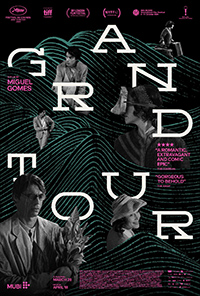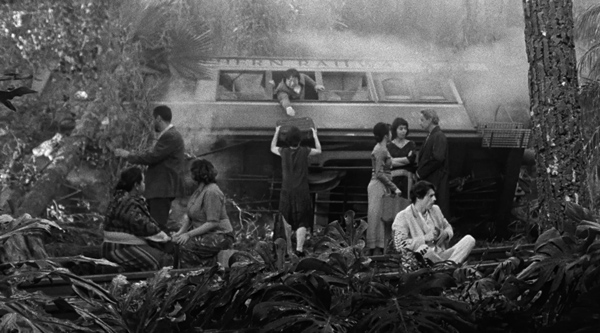Runaway Groom: Gomes Charts a Barren Odyssey
 In what serves as an extremely taxing personification of cold feet, Miguel Gomes feels as if he’s going through stylistic motions with his latest feature, Grand Tour. A surprise project considering his long gestating adaptation of Euclides da Cunha’s Backlands, it follows on the heels of his experimental pandemic film The Tsugua Diaries (2021), and his sprawling three part epic, Arabian Nights (2015). Blending documentary footage overlaid with heavy narration with a rather comically conceived bad romance, it’s a period piece which initially promises to slide into the unique territory of his 2012 masterwork, Tabu (especially as it’s utilizing the same two actors suffering beneath a different kind of compromised romance). But paralyzing tedium sets in by the time Gomes switches perspectives mid-way through, which makes this a beautifully photographed chore to sit through.
In what serves as an extremely taxing personification of cold feet, Miguel Gomes feels as if he’s going through stylistic motions with his latest feature, Grand Tour. A surprise project considering his long gestating adaptation of Euclides da Cunha’s Backlands, it follows on the heels of his experimental pandemic film The Tsugua Diaries (2021), and his sprawling three part epic, Arabian Nights (2015). Blending documentary footage overlaid with heavy narration with a rather comically conceived bad romance, it’s a period piece which initially promises to slide into the unique territory of his 2012 masterwork, Tabu (especially as it’s utilizing the same two actors suffering beneath a different kind of compromised romance). But paralyzing tedium sets in by the time Gomes switches perspectives mid-way through, which makes this a beautifully photographed chore to sit through.
Edward (Goncalo Waddington) and Molly (Crista Alfaiate) have been engaged for seven years, and she’s on her way to meet him for their wedding in Rangoon, set to take place in January, 1918. He’s been working as a civil servant for the British government in Burma. But just as Molly’s scheduled to arrive, Edward goes on a bender and sneaks aboard a ship to Singapore, leaving her a note about professional responsibilities he must tend to. Molly knows he’s running away from the wedding, and she decides to follow suit, always finding out where his next destination is and unwisely sending him telegrams, which forces him to keep fleeing. Eventually, Molly’s health condition lands her in Saigon until she recovers, making her tracking of Edward more strenuous.
The simplistic narrative bears resemblance to any number of other texts, and the film mostly bears the sensibilities of a gallivanting travelogue, which feels like Wim Wenders’ Until the End of the World (1991) meets Orpheus’ rescue operation of Eurydice from Hades (while Jia Zhangke’s latest, Caught by the Tides is also an eerily similar hybrid of docu footage assisting the narrative of a woman searching for the man who’s abandoned her). Style wise, there’s some moody playfulness with the mostly black and white footage (recalling early Guy Maddin, such as 1992’s Careful), but the most striking moments arrive courtesy of the documentary color footage of carnivalesque imagery and striking puppet shows. Rui Pocas, Sayombhu Mukdeeprom, and Gui Lang all served as cinematographers, which explains the shifting visual frames and textures.

As Edward and Molly hop from one location to the next, the language of the omniscient narrator explaining their mostly off screen events and emotions changes to match their current resting place. Edward moves from Saigon to Bangkok to Manila to Osaka to Shanghai and beyond, getting kicked out of a monastery he’s infiltrated and then left adrift by the narrative as we observe Molly following. Goncalo Waddington gets little to do but flirt with various women he comes across, vague ambiguities about the possibility he’s a spy mentioned but never developed. Once Crista Alfaiate arrives as Molly, Grand Tour nestles comfortably into a repetitive cycle, made all the more grating for Molly’s pronounced character tic of sputtering through her lips when she laughs (and she laughs a lot). Alfaiate resembles 1970s era Jane Fonda as Molly, and it’s a pity we never quite explore how she might really be feeling as the rooked fiancee. She’s courted by another wealthy man, but her tenacity (which might be more rightly deemed as an obsession) leads her onwards to a bitter end.
Gomes has always been a director keen to play with or subvert expectations, and little of Grand Tour actually feels like the period it’s supposed to be set in, especially when Edward reaches Saigon, and a beautiful but anachronistic ballet of bike riders navigate the streets. The ethnocentric tendencies of the narrative suggest Gomes intends for a subtler reading of this tiresome couple, each of them having no issue compromising the safety of others in their selfish missions. Ultimately, it’s like the anti-Odyssey, except we’re not ever made to feel intrinsically interested about the outcome.
Reviewed on May 22nd at the 2024 Cannes Film Festival – Competition. 129 Mins.
★★½/☆☆☆☆☆


